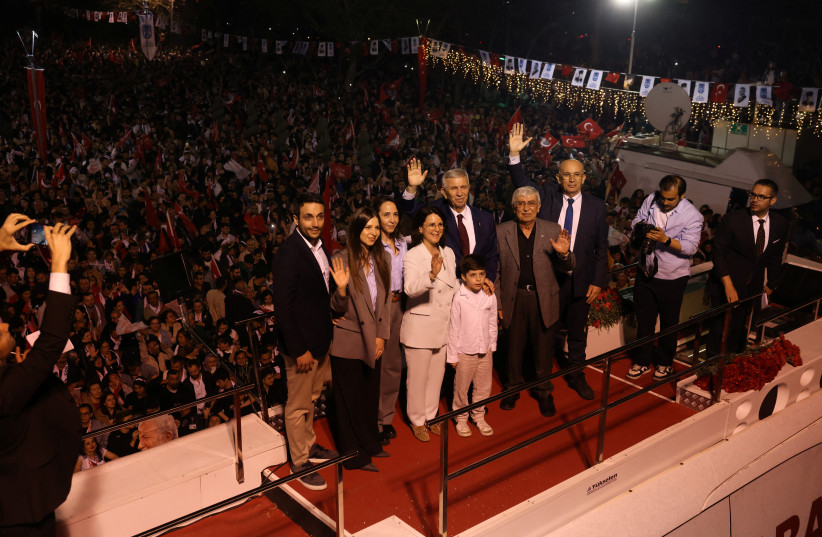On Sunday, around 48 million people out of around 61 million eligible voters cast their ballots in Turkey. This is considered a good turnout and shows that in Turkey, there is a vibrant demand for democracy. It also comes after two decades of, basically, one-party rule by the authoritarian AKP, which has dominated politics although it did not always have a majority of voters. Alliances and opposition splits enabled the AKP to maintain its control over Turkey. In recent years, however,the opposition has become better at uniting.
In essence, the voters in Turkey have a choice between the authoritarian and right-wing religious AKP, which has channeled political Islam into politics and has roots in the Muslim Brotherhood; parties that represent the secular nationalist tradition; and those that are more left or far-right. For instance, many people in the Kurdish areas of eastern Turkey vote for the DEM party. In western Turkey, along the coast, the secular nationalist CHP is more popular. The AKP has been more popular historically in the center of Turkey, which is more religious and traditional. It faces an uphill struggle in some municipalities because of the rise of the MHP and other parties that often offer various forms of far-right nationalist slates that appeal to some people.
The opposition claimed a major victory after many non-AKP parties appeared to perform well. Ekrem Imamoglu, the CHP leader in Istanbul, pulled off an exciting victory, and it wasn’t his first. He also won local elections in 2019. Of course, this is important because Istanbul has some 19 million residents – more people than in many countries. Therefore, these votes have the chance of transforming Turkey or at least preventing its slide into more authoritarianism and religious extremism under the AKP.
Many in Turkey are tired of the seemingly endless leadership of Recep Tayyip Erdogan. However, Erdogan has benefited from a world that has become more authoritarian in the last two decades. He’s not the only example of a leader who clings to power. Russia’s Putin, China’s Xi Jinping, and many others are walking in the same direction. They all want a new world order in which the West’s liberal, democratic traditions are replaced.

Turkey's exceptions to its pro-Palestinian stance
Turkey’s leader has often been a vocal opponent of Israel.
However, Turkey also likes to carve out some exceptions to that populist, pro-Palestinian ranting. This is because Ankara likes trade deals with Israel and also doesn’t want Israel-Greece-Cyprus ties to become too cemented. For instance, Turkey has occupied northern Cyprus since the 1970s, when it invaded the island. Turkey has also invaded Syria, displacing Kurds in Afrin in 2018 and carrying out other attacks against the US-backed SDF. Ankara also plays a role in northern Iraq; it claims to be fighting the PKK, which it labels terrorists.
Turkey has an important role to play in the region, a role that has often been destabilizing and has backed some extremist groups. However, some believe Turkey will one day balance Iran and Russia in the region. So far, this has not happened. Turkey continues to have warm ties with both Iran and Russia. Ankara also works closely with Doha, and both Doha and Ankara host Hamas members.
At the same time, Turkey and Qatar are both Western allies via NATO in Turkey’s case and via “major non-NATO ally” status in Qatar’s case. What this means is that two Western allies host Hamas. Hamas is also backed by Iran, Russia, and China to some extent. This means that this grouping of states – Turkey-Iran-Russia-China – is actively working against the West, often with groups like Hamas, to some extent. This presents a major challenge for the West and Israel.
The elections in Turkey are a setback for Erdogan. Ankara will likely seek to launch more military operations in Iraq or Syria to gain more populist support. Additionally, Ankara is likely to oust Kurdish mayors elected in eastern Turkey, thereby reversing the democratic victories of minorities. The overall effect of the elections in the Middle East will be to inspire some who still want a say in politics and democracy at home.
Because Turkey is a large Muslim country and also a democracy with a strong secular tradition, it has a lot of influence in the region and the world. It has sought to displace other traditional leaders of the Islamic world, such as Saudi Arabia, in this respect. Therefore, the elections have ramifications in Europe, in the Middle East, and even far beyond. Turkey plays an increasing role in Africa, for instance, where it seeks influence in Somalia, Sudan, and other places. It also has a role in Libya. Turkey also seeks to sell its Bayraktar drones abroad. In Ukraine, it also has interests. As such, it sits atop many “files” that matter globally. The elections will play into that.
Several years ago, Ankara was involved in cooking up many crises in the eastern Mediterranean. It remains to be seen if it will go back to that crisis drive. It may be waiting to see what happens in the US elections in the fall.
